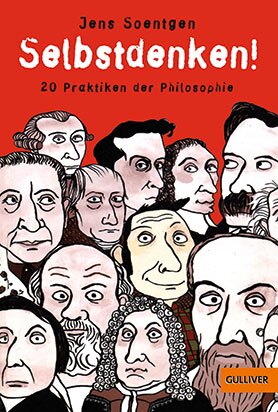Jens SoentgenNadia Budde
Selbstdenken! 20 Praktiken der Philosophie
[Think for yourself! 20 philosophical strategies]
- Peter Hammer Verlag
- Wuppertal 2003
- ISBN 3-87294-943-8
- 223 Pages
- Publisher’s contact details
Jens Soentgen
Selbstdenken! 20 Praktiken der Philosophie
[Think for yourself! 20 philosophical strategies]
Sample translations
Review
Jens Soentgen succeeds in bringing philosophy to life. Soentgen presents his subject matter in an entertaining and witty manner, making it easy to follow and to understand. The book – a twenty-first century version of Aristotle’s Topics, less bulky than the original and written in a modern and straightforward style – introduces the reader to twenty philosophical strategies, revealing how and when they can be used. Throughout the book the reader is encouraged to think for himself – Soentgen uses amusing examples (showing by the by that philosophers are also only human) as well as practical tips and suggestions for games, which allow the reader to put what he’s been reading to the test. Soentgen isn’t afraid of discussing popular culture alongside the infinitely more complex ideas of great philosophers. In a chapter entitled ‘Specifying and Defining’, he draws on two examples to illustrate what it means to be specific. The first example comes from Loriot’s film Pappa ante portas:
MR LOHSE From now on I’ll be devoting all my time to… errm… to my family.
LOHSE JUNIOR Does that mean you’ve retired?
MR LOHSE Errm, yes! You could put it that way.
The second example is taken from a debate between Jürgen Habermas and Karl Popper:
HABERMAS Theories show themselves to be applicable to a specific subject area if real diversity conforms to them.
POPPER Theories are applicable to a specific area if they are applicable.
The book also stands out in terms of design: the illustrations are clever and original, and the layout is clear. The chapters are relatively short: concise enough not to intimidate newcomers to philosophy, but long enough to allow each argument to be properly developed. Of course, some themes require more explanation than others, which is why ‘Waiting’ takes up only four pages, while ‘Logic’, the longest chapter in the book, necessitates a full twenty pages, including numerous illustrations.
When the subject matter starts to get difficult, Soentgen subdivides the chapters into smaller sections, using helpful headings to guide the reader through the text.
As Soentgen discusses a range of themes, he takes care to adapt the form of the book to its content. Soentgen isn’t interested in forcing the different strategies into a standarized account. That’s why he uses a wide variety of examples, ranging from anecdotes from ancient Greece, verbal duels from the world of physics, arguments between ordinary people – referred to as ‘Mr and Mrs Smith’ – to diagrams (borrowed from the mathematician Leonhard Euler) serving to illustrate the Aristotelian syllogism. What matters is not the origin of the examples, but their usefulness in explaining the subject matter.
Soentgen’s tone is not that of the superior schoolmaster: his book gives the reader the agreeable impression that no question is too silly to ask. Even though you suspect that the author prefers some of his philosophical colleagues (past and present) to others, the book is written with enormous sympathy for the many philosophers and theories it discusses.
The following list provides a brief summary of the main topics and examples discussed in the individual chapters:
1. Being Provocative
Socrates: questioning society’s values
Diogenes and the Cynics
Commune 1: inverting the norm
2. Facts and Quotes
On the subjectivity of facts and the perspectivity of things
Taking philosophical comfort: seeing unwelcome facts in a new and different light
The possibilities of citation: creating new contexts
Distortion or implying that your interlocutor doesn’t understand
3. Clues
On the art of reading a philosophical trace
Physiognomics and the heads of great thinkers
Goethe and the divine signs
4. Citing Authority
Leonard Euler’s Three Truths
Are some thinkers overrated?
Dismissing arguments because of the company they keep
Thinking for yourself as a consequence of witch hunts
Thomasius’s theory of prejudice
5. Looking Carefully
Why philosophy needs new examples
Husserl and phenomenology
You mainly see what you already know
6. Examples
Examples serve to illustrate and not as proof
Prophecies are ‘examples in the future-tense’
The difference between illustrating and justifying: a numerical explanation
7. Specifying and Defining
Being specific: synonyms as a way of making useful distinctions
On the difficulty of general definitions and the usefulness of specific ones
Stumbling blocks on the way to definitions
8. Illustrations
Metaphor, allegory, analogy and comparison
When a parliamentary election resembles a football game
The dangers of making comparisons
The usefulness of unexpected interconnections
9. Collecting
Two types of file-card system: Luhmann and Bacon
Excursus: what type of reader am I?
10. Logic
The Aristotelian system of logical conclusions and its translation into diagrams by Leonhard Euler
Five rules for coming to logical conclusions
Circular arguments and short circuits
11. Dismantling
How to disarm an opponent by making him look ridiculous: philosophical mobbing
12. Thought Experiments
The desire for eternal life or the return of the same: Jonathan Swift and Friedrich Nietzsche
The theoretical hunt for the right form of society: John Rawls and the veil of ignorance
On creativity and originality: Eco, Borges, Lewis Carroll and maps to the scale of 1:1
13. Waiting
On the merit of waiting while you’re thinking
14. Using Inversions
Turning the tables
Changing the order and finding new meanings
Using the arguments of great philosophers to disprove their own theories: Kant, Carnap and Einstein
15. Parody
How does parody work?
Lichtenberg’s parody of the physiognomist Lavater
Fritz Heidegger plays Martin Heidegger
Parodies in philosophical encyclopaedias: the x-factor
16. Series Connection
‘Pure repetition’ as used by advertising agencies and politicians
On the recurring ‘end’ of physics
Randomness as ‘chaotic series connection’: the cacophony of counter-arguments
17. The Oracle
The intoxicated priestesses of Delphi and their amazing prophecies
Excursus: Spirituality and the ancient Greeks
18. Combinatorics
Llull’s combinatorics: ideas on wheels
Aristoteles and Habermas
When will it all have been said? Leibniz and the sum of all possible statements
19. Causes
The principle of sufficient reason and the notion of multiple causation
Aristotle’s system of the Four Causes
Apportioning and erasing blame: the search for different causes
20. Grand Gestures
Actions speak louder than words

MR LOHSE From now on I’ll be devoting all my time to… errm… to my family.
LOHSE JUNIOR Does that mean you’ve retired?
MR LOHSE Errm, yes! You could put it that way.
The second example is taken from a debate between Jürgen Habermas and Karl Popper:
HABERMAS Theories show themselves to be applicable to a specific subject area if real diversity conforms to them.
POPPER Theories are applicable to a specific area if they are applicable.
The book also stands out in terms of design: the illustrations are clever and original, and the layout is clear. The chapters are relatively short: concise enough not to intimidate newcomers to philosophy, but long enough to allow each argument to be properly developed. Of course, some themes require more explanation than others, which is why ‘Waiting’ takes up only four pages, while ‘Logic’, the longest chapter in the book, necessitates a full twenty pages, including numerous illustrations.
When the subject matter starts to get difficult, Soentgen subdivides the chapters into smaller sections, using helpful headings to guide the reader through the text.
As Soentgen discusses a range of themes, he takes care to adapt the form of the book to its content. Soentgen isn’t interested in forcing the different strategies into a standarized account. That’s why he uses a wide variety of examples, ranging from anecdotes from ancient Greece, verbal duels from the world of physics, arguments between ordinary people – referred to as ‘Mr and Mrs Smith’ – to diagrams (borrowed from the mathematician Leonhard Euler) serving to illustrate the Aristotelian syllogism. What matters is not the origin of the examples, but their usefulness in explaining the subject matter.
Soentgen’s tone is not that of the superior schoolmaster: his book gives the reader the agreeable impression that no question is too silly to ask. Even though you suspect that the author prefers some of his philosophical colleagues (past and present) to others, the book is written with enormous sympathy for the many philosophers and theories it discusses.
The following list provides a brief summary of the main topics and examples discussed in the individual chapters:
1. Being Provocative
Socrates: questioning society’s values
Diogenes and the Cynics
Commune 1: inverting the norm
2. Facts and Quotes
On the subjectivity of facts and the perspectivity of things
Taking philosophical comfort: seeing unwelcome facts in a new and different light
The possibilities of citation: creating new contexts
Distortion or implying that your interlocutor doesn’t understand
3. Clues
On the art of reading a philosophical trace
Physiognomics and the heads of great thinkers
Goethe and the divine signs
4. Citing Authority
Leonard Euler’s Three Truths
Are some thinkers overrated?
Dismissing arguments because of the company they keep
Thinking for yourself as a consequence of witch hunts
Thomasius’s theory of prejudice
5. Looking Carefully
Why philosophy needs new examples
Husserl and phenomenology
You mainly see what you already know
6. Examples
Examples serve to illustrate and not as proof
Prophecies are ‘examples in the future-tense’
The difference between illustrating and justifying: a numerical explanation
7. Specifying and Defining
Being specific: synonyms as a way of making useful distinctions
On the difficulty of general definitions and the usefulness of specific ones
Stumbling blocks on the way to definitions
8. Illustrations
Metaphor, allegory, analogy and comparison
When a parliamentary election resembles a football game
The dangers of making comparisons
The usefulness of unexpected interconnections
9. Collecting
Two types of file-card system: Luhmann and Bacon
Excursus: what type of reader am I?
10. Logic
The Aristotelian system of logical conclusions and its translation into diagrams by Leonhard Euler
Five rules for coming to logical conclusions
Circular arguments and short circuits
11. Dismantling
How to disarm an opponent by making him look ridiculous: philosophical mobbing
12. Thought Experiments
The desire for eternal life or the return of the same: Jonathan Swift and Friedrich Nietzsche
The theoretical hunt for the right form of society: John Rawls and the veil of ignorance
On creativity and originality: Eco, Borges, Lewis Carroll and maps to the scale of 1:1
13. Waiting
On the merit of waiting while you’re thinking
14. Using Inversions
Turning the tables
Changing the order and finding new meanings
Using the arguments of great philosophers to disprove their own theories: Kant, Carnap and Einstein
15. Parody
How does parody work?
Lichtenberg’s parody of the physiognomist Lavater
Fritz Heidegger plays Martin Heidegger
Parodies in philosophical encyclopaedias: the x-factor
16. Series Connection
‘Pure repetition’ as used by advertising agencies and politicians
On the recurring ‘end’ of physics
Randomness as ‘chaotic series connection’: the cacophony of counter-arguments
17. The Oracle
The intoxicated priestesses of Delphi and their amazing prophecies
Excursus: Spirituality and the ancient Greeks
18. Combinatorics
Llull’s combinatorics: ideas on wheels
Aristoteles and Habermas
When will it all have been said? Leibniz and the sum of all possible statements
19. Causes
The principle of sufficient reason and the notion of multiple causation
Aristotle’s system of the Four Causes
Apportioning and erasing blame: the search for different causes
20. Grand Gestures
Actions speak louder than words
Translated by Sally-Ann Spencer

By Heike Friesel
